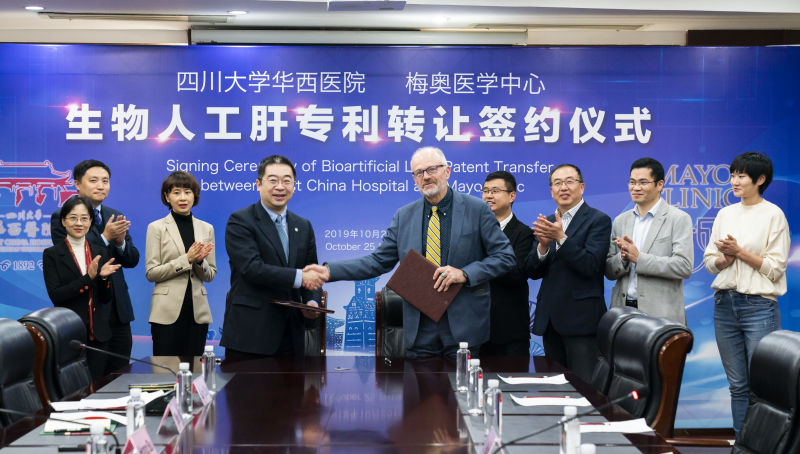
On October 25th, West China Hospital of Sichuan University and Mayo Clinic sign a bioartificial liver patent transfer agreement, whereby West China Hospital will transfer to the No. 1 hospital in the United States two patents with independent intellectual property rights, involving artificial liver bedside treatment device: bioartificial liver system and fluidized bed bioreactor. This is the first patent transfer agreement reached between Mayo Clinic and a hospital in mainland China.
Prof. Scott L. Nyberg, Professor of Transplant Surgery and Director of the Artificial Liver Research Office at the Mayo Clinic and Prof. Shen Bin, Deputy Party Secretary of WCH of our hospital attended the signing ceremony. Prof. Shen Bin said that the research on bioartificial liver combined with WCH and Mayo Clinic has made great achievements, and will benefit tens of millions of patients with liver failure, which has important clinical significance and wide application value. This cooperation has also set a good example for other WCH-Mayo academic cooperation teams. In the future, the cooperation between the two sides will have broader prospects and fruitful results.
There are more than one million new cases of liver failure in China each year, another 30 million patients with chronic hepatitis are at risk, and the incidence of severe liver failure has exceeded that of lung cancer, gastrointestinal tumors and liver cancer. At present, the means of treating liver failure include medicine treatment in the early stage and liver transplantation in the late stage. However, due to the lack of donors, the proportion of liver transplantation in China is less than 2% each year. In addition to liver transplantation, more patients with liver failure receive traditional artificial liver treatment mainly based on plasma exchange (exchange transfusion) and physical artificial liver. Yet, owing to severe shortage of plasma supply and sole function of physical artificial liver, traditional artificial liver treatment cannot meet the needs of physicians and patients, and bioartificial liver is a possible solution. Therefore, bioartificial liver has important clinical significance in broad application to fill in the huge gap between drug treatment and liver transplantation.
The basic principle of bioartificial liver (BAL) support system is to place live hepatocytes in a bioreactor and exchange their substances with the patient’s plasma through a semipermeable membrane, so as to partially replace the liver’s functions of synthesis, metabolism and detoxification. In this way, liver’s function is maintained in a short-term, saving more time for patients to get liver transplantation. Besides, it also promotes the recovery of autologous liver function, so some patients with liver failure do not need liver transplantation due to their liver regeneration.
The hepatocyte spheroids in SRBAL (Spheroid Reservoir Bioartificial Liver), developed by Prof. Scott L. Nyberg from Mayo Clinic, the No. 1 medical center in the United States, is one of the most advanced BAL systems in the world, which is at the conversion stage from laboratory to market.
In the two patents transferred to Mayo Clinic, the safe, reliable and efficient whole blood perfusion bioartificial liver system enables uninterrupted continuous treatment. Integrating the functions of nutritional support and artificial kidney, it provides more effective treatment for patients with liver failure. The fluidized bed bioreactor can utilize the space more efficiently and reduce the use of medium by more than 50%, and the more simplified and reasonable structure is also beneficial to industrial production. Therefore, applying these two technologies to Mayo Clinic’s SRBAL system can reduce treatment costs by over 60%.
According to the agreement, Mayo Clinic will apply these two technologies to its SRBAL system to speed up the implementation of the “bioartificial liver” equipment patent and then realize its clinical application and market sales, so that more patients with liver diseases can benefit from it. At the same time, through the patent transfer with Mayo, West China Hospital is on par with other world-class teams in the field of “bioartificial liver”. In the future, it will proceed with preclinical research and accumulate data, so as to build its own brand in this field.
Related article can also be found on the official website of CGTN. (https://news.cgtn.com/news/2019-10-28/West-China-Hospital-transfers-key-patents-to-Mayo-Clinic-LabC2pyE8M/index.html?from=groupmessage.)